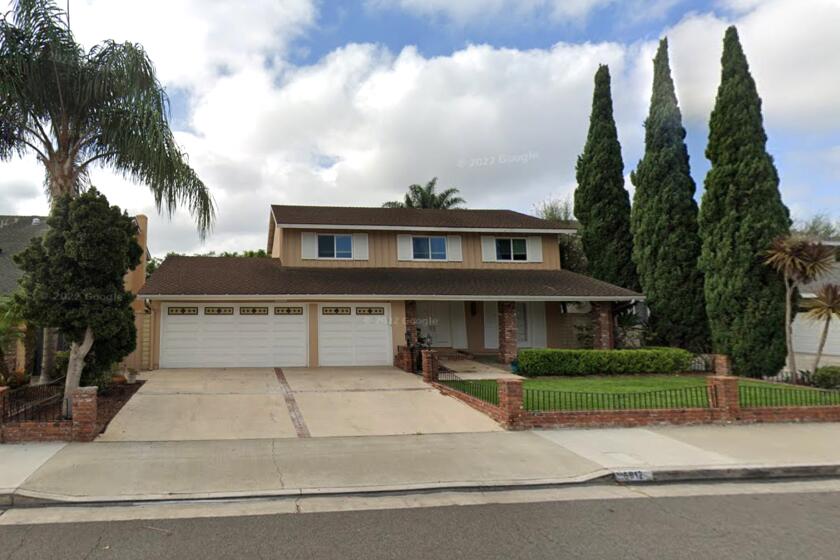Sober-living operator’s lawsuit against Costa Mesa goes to jury
The month-long trial in a sober-living home operator’s lawsuit against the city of Costa Mesa was sent to the jury after closing arguments wrapped up Thursday.
The case could have far-reaching effects on the city’s jurisdiction over group homes within its boundaries.
Yellowstone Recovery, which has had a presence in Costa Mesa dating to 1988, sued the city in November 2014 over an ordinance that regulates group homes. Yellowstone, which was joined in the suit by two other operators, Sober Living Network and Lynn House, alleged the law unfairly discriminates against people recovering from drug and/or alcohol addiction, whom the operators serve through residential group facilities.
Ordinance No. 14-13, adopted in October 2014, regulates group homes in the city’s single-family residential zones and requires sober-living homes to apply for permits to operate in those neighborhoods. It caps the number of residents in a group home at six and prohibits sober-living homes from being within 650 feet of one another.
The ordinance also regulates sober-living staff, or house managers, saying they cannot have records of violent felonies or drug, arson or sexual offenses in the past seven to 10 years.
In December 2014, the city Planning Commission unanimously denied Yellowstone’s request for an exemption to house 15 people in a recovery home on Boston Way. The company holds a state license permitting up to 15 beds in a single facility, and it had two other sober-living homes in town that were in compliance with the rules.
In their closing argument Thursday in a Santa Ana federal courtroom before U.S. District Judge James Selna, lawyers for the plaintiffs painted their clients as well-meaning organizations blocked from providing adequate housing for recovering addicts, who are considered disabled and protected by the Americans with Disabilities Act and federal fair-housing laws.
“Just let us keep doing what we’ve been doing for 25 years,” attorney Isaac Zfaty said.
The city’s lawyers portrayed Costa Mesa as accommodating and working in the best interest of group homes’ residents as well as the wider community.
The plaintiffs argued that the ordinance unfairly targets sober-living homes when they shouldn’t be classified any differently than other residential households. They called attempts to cap bed numbers, monitor parolees and determine who can work as house managers as excessive oversight.
“We are not a hospital, we are not treatment, we are just housing where disabled people live,” said attorney Christopher Brancart.
The city targeted sober-living homes by conducting “parole raids,” according to Zfaty, who added that one city employee scouted and documented sober-living housing.
Brancart said code enforcement personnel accompanied police on calls to sober-living properties — another example of what he called targeted oversight.
Jennifer Keller, a lawyer the city contracted in March to defend Costa Mesa against lawsuits from sober-living operators, said the city “had formerly lovely, tranquil neighborhoods and they were suddenly under siege” by “hoards” of people moving into group homes.
Keller described sober-living homes as places with “bunk beds in every room” where residents are “packed in like sardines.”
She said such homes triggered neighbors’ complaints about noise and needles and that some nearby residents had been motivated to leave the area.
She said the city decided not to grant Yellowstone’s request for 15 people after hearing from neighbors.
The ordinance, she said, “was a thoughtfully considered and carefully implemented law.”
The distance requirement aims to maintain the character of neighborhoods amid dramatic changes in housing, namely growth in group homes and rising housing costs, Keller said. She noted that the rule was refashioned to allow four times the density of group homes than originally proposed.
But Yellowstone counsel Steven Polin argued that the city “can’t use land to tell addicts and alcoholics that they can’t live in your city.”
Keller’s closing “showed that the city worked to create a thorough regulatory scheme that would protect disabled residents plus preserve the quality of the neighborhood,” Costa Mesa Mayor Katrina Foley said.
She said the plaintiffs’ position is essentially that “the city cannot regulate in any way sober-living homes,” which she called “untenable.”
Attorneys for the sober-living home operators said their clients — including Yellowstone Chief Executive Anna “Dr. Honey” Thames, who was in the audience Thursday morning — would not comment about the trial.
All the latest on Orange County from Orange County.
Get our free TimesOC newsletter.
You may occasionally receive promotional content from the Daily Pilot.




